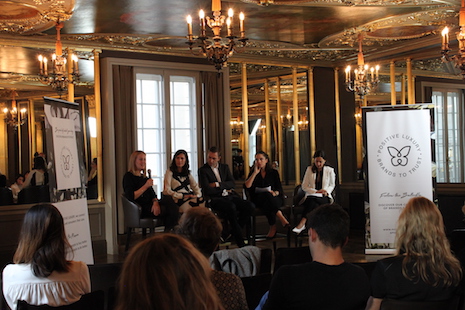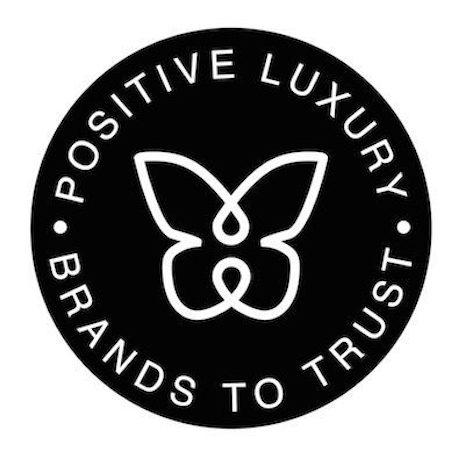 Promotional image for Selfridges' shoppable app. Image credit: Selfridges
Promotional image for Selfridges' shoppable app. Image credit: Selfridges
While corporate social responsibility should be a no-brainer, businesses must look for purpose beyond profits to attract and retain consumers.
During Positive Luxury’s Positive Week 2017 Oct. 2- 6, the eco-conscious platform held a panel discussion Oct. 3 at London’s Cafe Royal Hotel where speakers from the diamond, retail, capital investment and watchmaking sectors spoke about how responsible business practices are possible. Today more than ever, consumers are more socially aware and prefer to shop brands that are transparent and operate sustainable businesses.
“We started Positive Week with the intention of really celebrating those brand that not only produce beautiful user experiences and beautiful products, but also, at the same time, invest in social good and environmental responsibility," said Diana Verde Nieto, CEO of Positive Luxury, London.
"The s-word, sustainability, is not very sexy or something that people perhaps are not engaging with," she said. "The reality is sustainability has been overused for many years and the consumer, especially the younger generation, don’t feel anything for the word.
"However, the good news is is that people care more than ever before about others and also about our planet. So, good businesses have the responsibility to not only do everything a consumer expects, but also play a role in bettering the community and bettering their internal operations to have a healthy ecosystem, healthy planet and people. That’s what ‘positive luxury’ means."
Sustainable success
A concern for many publicly owned businesses is that investors will not approve of sustainability efforts due to the impact CSR can have on a company’s bottom line.
But, according to Mark Ferguson, co-chief investment officer, Generation Investment Management, the benefits of implementing such practices outweigh the risk factors, and integrating ethical and sustainable practices is better for investors in the long-term (see story).
Mr. Ferguson was joined on Positive Luxury’s “Responsible Business in the Luxury Industry” panel by executives in diamonds, retail and watchmaking to discuss how the conversation around sustainability must move away from short-term returns to long-term objectives to facilitate change.
Now that sustainability is non-negotiable, brands must place the social purpose of their business at the forefront to make headway with millennial consumers.
For De Beers’ Forevermark, Jo Blake, head of communications at Forevermark, explained that sustainability has been the baseline of the diamond producer industry. Since millennials have been wary of diamonds and their origins, Forevermark has made its mission to go beyond the call of duty to reassure consumers, especially cautious millennials.
From left to right: Forevermark's Jo Blake, Selfridges' Daniella Vega, Generation Investment Management's Mark Ferguson, Baume et Mercier's Marie Chassot and Positive Luxury's Diana Verde Neito. Image credit: Positive Luxury
Forevermark, for instance, promotes the transparency of its ethical diamond sourcing and pipeline through its identification inscriptions that tell the of a stone’s journey from discovery at the mine all the way to its arrival at a retailer’s point of sale.
Also, Forevermark takes pride in its business initiatives that give back to diamond-producing communities, the environment and its protection of biodiversity. For diamond-producing communities, this includes health care, education and business loans for local entrepreneurs.
Similarly, British retailer Selfridges’ CSR programs also instill trust in its business. The department store chain has been a champion of sustainability (see story), and as a “house of brands,” feels it is its responsibility to curate likeminded labels.
Daniella Vega, head of sustainability at Selfridges, stressed that this commitment is demonstrated by Selfridges’ merchandise buyers and their personal knowledge of sustainability practices. Selfridges’ buyers make sure to ask brands and manufacturers not just a straightforward “Are you sustainable?”, but more impactful questions that ask about sourcing, supply chain and business practices.
Transparency is also extended to Selfridges’ signage, which includes Positive Luxury’s Butterfly Mark, an indication of a sustainable brand (see story).
Positive Luxury's Butterfly Mark identifies brands to trust. Image credit: Positive Luxury
Also, Selfridges spotlights sustainable materials such as cotton, which is considered one of the most environmentally friendly textiles, and brands that are members of the Better Cotton Initiative, to assist consumers in making better purchase decisions.
At Swiss watchmaker Baume et Mercier, the materials it uses to create its timepieces are also taken into consideration. Baume et Mercier, for example, looks to lessen its environmental impact by leveraging a circular economy that reuses materials.
As millennial consumers’ timepiece sentiment has changed drastically, watchmakers have had to reinforce values as a method to build awareness, especially as smartwatches have surged in popularity.
To this point, Baume et Mercier’s senior vice president of marketing Marie Chassot shared that the watchmaker has developed an upcoming initiative that will focus on designing a better future by giving back in ways that support the brand’s moral codes. Charitable causes create value for consumers outside of actual products.
Sustainability has cause a major transformation in consumers’ purchasing habits and behavior and has resulted in brand CSR becoming an unavoidable necessity.
Positive Week 2017: Responsible business in the luxury industry

